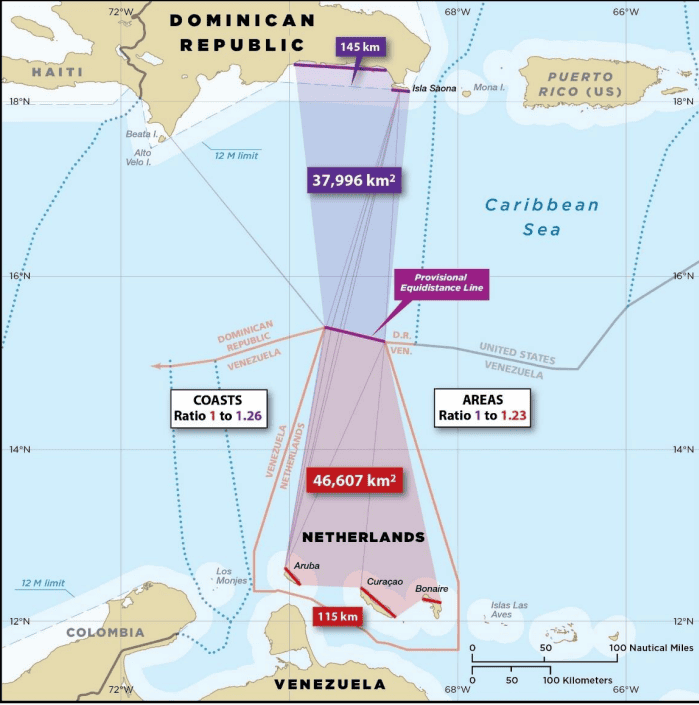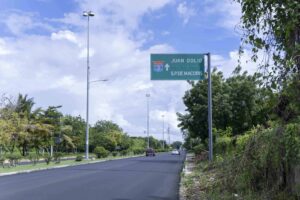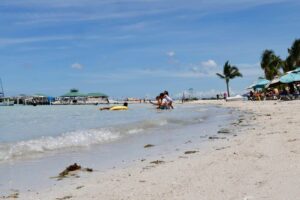
The match Power of the People (FP) rejected the sentence of the Constitutional Court (TC) who declared in accordance with the Constitution the Agreement between the Dominican Republic and the Kingdom of the Netherlands on maritime legitimation.
In the agreement, signed by Foreign Minister Roberto Álvarez, the government ceded an important part of its territorial waters off its southern coast, in the Caribbean Sea, in favor of the islands Aruba, Curacao and Bonaire, property of the Kingdom of the Netherlands. located in the north of Venezuela, according to the complaint of the FP Secretariat of International Affairs.

Manolo Pichardo, its coordinator, agreed with the arguments expressed by the six judges of the TC who rejected the agreement in the sense that Law number 66-07, which declares the Dominican Republic as an archipelagic state and defines an Economic Zone, was not recognized. Exclusive that expanded up to 200 nautical miles.
The signatories relied on the “principle of equidistance” between the Dominican Republic and the colonies of the Kingdom of the Netherlands in the Caribbean, and not on the “Principle of Equity.”
In this way, they marked a midpoint in the sea taking into account the coastlines of the Dominican and Dutch territories.
With the declaration of archipelagic state, the Dominican territory was marked with a line between the outer islands that make it up, leaving inside more than 150 smaller islands, a high number of reefs, outcrops and other natural elements.
From this border, the domain of the Dominican Republic over the sea expanded and went into the sea.
The sentence was approved with seven votes in favor, four dissenting votes and two saved. In his dissenting opinion, Judge Domingo Gil establishes:
“The first thing I must reproach the agreement for is having ignored, as an implicit background condition, that the Dominican Republic is an archipelagic State, ignoring one of our laws, Law number 66-0727. This means that the agreement was “set up” on the denial of our own legislation. This translates into the de facto, but real, repeal of a law through an international agreement, which means that the Executive Branch negotiated an agreement that ignores a Dominican law and has assumed the powers of the National Congress. “.
He also referred to the principle of “equity”, according to which it should be taken into account that the width of the coast of the Dominican Republic (145 kilometers) is wider than that of the islands of the Netherlands (115 kilometers: “.. . puts us in similar conditions to those Dutch colonies, despite the great difference in coastline width between the Dominican Republic and those small islands. With this, the Dominican Republic foolishly agrees to renounce invoking the equity criteria provided in this regard. by Convemar”.
Judge José Alejandro Vargas Guerrero also questioned in his dissenting vote that the status of archipelagic state was omitted:
“There is no reference to it in the treaty, nor to the validity or invalidity of its measurements, nor are the geodetic points established by it considered, even knowing that this norm is the result of a constitutional mandate, specifically article 9, that declares the Dominican territory as inalienable”.
These two judges also considered that the agreement benefits the Netherlands with regard to the exploitation of mineral resources found on the seabed.
Article 3 provides that “in the event that a geological structure or mineral deposit containing oil or natural gas extends through the line established in Article 2, and a part of said structure or mineral deposit that is located on one side of the line can be exploited totally or partially from the other side of the line, the Parties, after carrying out technical consultations, will make their best efforts to seek to reach an agreement on the most effective way to exploit said structure or deposit.
“Let’s imagine what could happen in the future given our technological inability compared to the Netherlands, an economic power in the exploitation of marine resources, especially hydrocarbons,” established Judge Gil.
Power of the People He expressed distrust in the judgment of the magistrates, especially the last ones who were appointed during the administration of Luis Abinader.
“We find it strange that, of the seven judges recently incorporated into the Constitutional Courtonly one of them, Judge Amaury Reyes Torres, cast a saved vote, and the others voted in favor of the constitutionality of the agreement,” reads the FP protest document.
Manolo Pichardo assured that the TC ruling is based on the “principle of Equidistance”, used in previous agreements with Colombia and Venezuela in the 70s, when the legal framework that regulates these matters currently did not yet exist.
“This agreement is harmful to our sovereignty and violates the Constitution. We do not understand how Constitutional Court has ignored Law 66-07, which declares the Dominican state as an Archipelagic State, recognizing more than 150 minor islands and keys that are part of our maritime territory,” Pichardo stated.
Goes to Congress
The aforementioned agreement, signed in July 2025 by Roberto Álvarez and the ambassador of the Netherlands in the country, Annemieke Verrijp, still needs to be approved by the National Congress.
FP warned that “if the National Congress approves this agreement as it is, a dangerous precedent will be established for the sovereignty of the Dominican Republic in future territorial disputes.”



